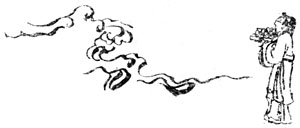
SOME KNOWLEDGE ABOUT
BUDDHISM
-by Upasaka. C.T. Shen
Clearly, giving is a representation of compassion. In Buddhism this is called Dana, which is a Sanskrit word. There are three kinds of dana:
1) Dana of material giving things to the needy,
2) Dana of knowledge imparting proper knowledge to others to free them from sufferings due to ignorance, and
3) Dana of fearless ness helping others to free themselves from fears of any kind.
For the enlightened one, dana is a spontaneous action arising from great compassion. It is unconditional, without discrimination and without limitation. For us ordinary people, dana is the most important practice of great compassion which leads the way to Buddhahood.
Now, you may wish to say to me: "That is fine and interesting. But can you give us some practical ideas so that we may practice to make our lives more peaceful and enable us to sleep better?"
I will be pleased to do so. Let me tell you a story. It is called, "why do you still carry the girl on your back?"
It happened 1n China about 1,000 years ago, and for better under-standing I will give you some background information. At the time this story took place, the social relationships between men and women in China were very strict. You may have heard the fact that girls seldom went out of their houses before marriage. This kind of restriction was particularly enforced in Buddhist communities. In one of the sects of Buddhism at that time in China the monks were not allowed to laugh or smile at a woman. They could not touch a woman's body or expose their chests or legs in front of a woman. Otherwise they were in great error. The story is as follows:
There were two monks of middle age, each of whom had had many years of study and training in a Buddhist monastery belonging to that sect, so that they knew the precepts mentioned above very well. One day they were travelling on foot. It was late afternoon when they arrived at a river. There was no bridge or ferry, but the river was shallow and they believed they would have no difficulty in wading across it. Suddenly they saw a young lady who was attempting to cross the river, too, but was hesitating to step into the water. She was in trouble. So one of the monks went to her and offered to help by carrying her across the river on his back. The other monk was very much surprised by what his brother monk had done. Puzzled and frustrated, he was very unhappy as he followed them to the other shore of the river. The first monk put down the lady, who thanked him and left. The two monks continued their journey. While walking, the second monk could not forget the incident. He wondered how his brother monk could violate the precepts that they had observed for so many years. What a grave offense he had committed, and even in another's presence. Could it possibly be that he violated other important precepts when he was alone? It was about dark now and they found an abandoned temple. They were tired and went into the temple to lie down. The first monk immediately fell asleep but the second one could not. First he was frustrated then he felt pity for his brother monk for committing such a grave offense. He tried to pray for him to reduce his offense but he imagined all kinds of things. He tossed fretfully and could not get to sleep. At about dawn, he heard the snore of sound sleep from his brother monk, and he became very angry. He made a noise, which woke the first monk. "What happened to you, my brother? Why didn't you sleep?" The second monk answered angrily: "Do you know what you have done? What are our precepts? How could you hold a girl on your-back and wade across the river? I could not sleep because I was trying my best to pray so as to minimize your offense, but you simply don't care and slept soundly."
The first monk replied, "Oh, you are talking about that lady. I dropped her a long time ago as soon as we crossed the river, but why do you, my brother, still carry her on your back?"
Thank you very much.
